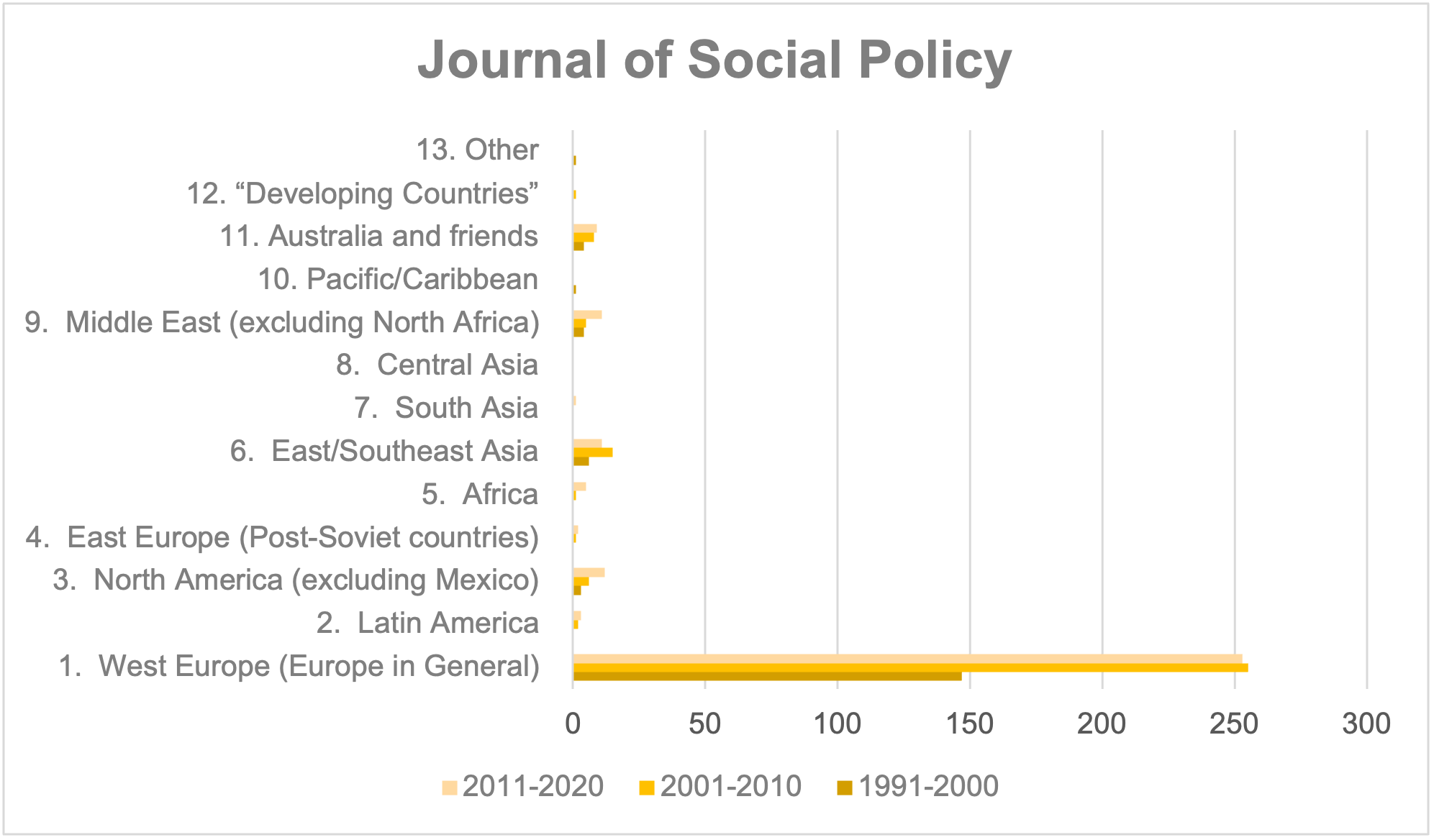Welfare state and social policy research are inherently Eurocentric. Scholars who make their careers in developing and refining concepts and analytical tools and methods on welfare statism usually have done so while writing and publishing mainly in and North American and European countries. There is no welfare state paradigm in the world that does not draw on the experiences with and the histories of Western metropoles since the nineteenth century great transformations of capitalism, industrialism, democracy and citizenship. The history of how Germany, Sweden, the United States, Britain, France, and Italy developed modern social policies to respond to the demands of lower-income groups remains constitutive, to this day, for our thinking about the nature of social rights, modern solidarity, and welfare state commitments.
One explanation for this bias is found in the longer histories of welfare statism in these countries, which make it easier to narrate those developments, establish causal relations, and from there draw general theories to explain where social policies come from, how they operate, and where they go. Unsurprisingly, there is much more available data about those countries that was used to develop early welfare theories, as in the seminal works of Skocpol, Esping-Andersen, Korpi, and others. This is a feature of the social sciences, in general, and not limited to welfare state debates. Global North realities are much more researched, written about and made sense of, as shown recently by Wilson and Knutsen.
Many scholars working on peripheral regions and histories produce great scholarship on issues on inequality, public welfare and social policies and find enough publication venues and opportunities in the existing and expanding academic journal landscapes. Research on anything from housing to healthcare, pensions, unemployment, primary schooling, maternal welfare and new social protection schemes in Africa, Asia, Latin America and the Caribbean will find relevant outlets.
But the social policy landscape represented in mainstream academic journals is still very one-sided, as they continue to draw on contributions depicting mostly European and North American realities and findings. Diverse geographies, histories and cultures are just not addressed in this landscape. This amounts to an epistemic practice of seclusion and exclusion that promotes uniform conversations, where the existing biases in research interests are reproduced over and over. As a result, many OECD oriented scholars writing on welfare statism claim to generate ever more differentiated arguments and allegedly ever more refined and innovative datasets to make valid claims about contemporary welfare worlds, but ultimately draw on a very limited pool of knowledge.
The geographical underrepresentation of many world regions in mainstream welfare and social policy research is made evident in the following figures, that cover three decades of publications in the Journal of Social Policy and Social Policy & Administration. In these outlets (Figs. 1 and 2), the OECD bias remains unbroken. Earlier attempts from the 2000s to broaden the geographical coverage of mainstream welfare state research, as in Wood & Gough’s Insecurity and Welfare Regimes and Haggard & Kaufman’s Development, Democracy, and Welfare States, have not really borne fruit among the core epistemic sites of welfare statism.

Figure 1: World region references of articles in the Journal of Social Policy, 1990s to 2010s

Figure 2: World region references of articles in Social Policy & Administration, 1990s to 2010s
In Social Policy & Administration, there is, however, a visible effort in opening up space for articles covering East and Southeast Asia in the past two decades. Sadly, even a journal that on first sight appears committed to speak for and represent realities beyond the OECD, such as Global Social Policy, suffers from the same overemphasis on European and North American realities (Fig. 3).
Figure 3: World region references of articles in Global Social Policy, 2000s to 2010s
The kind of academic differentiation mentioned above that creates every more specific debates on the state of European welfare regimes in itself does not have to pose a problem. In fact, Max Weber, albeit quite critically, identified it more than a century ago, in his “Science as Vocation”, as the main mode of innovation in modern social sciences. However, this differentiation becomes dysfunctional when the core body of an academic discipline cannot speak of other contemporary worlds and struggles because it shows little interest or curiosity about diverse regions, countries, and histories. This may, implicitly or explicitly, assume that other regions have seemingly little to contribute to the real, the central welfare state debates of our time. These assumptions ignore critical evidence a time when Global Social Governance architectures are unfolding in the real world.
Occasionally, scientific fields reach a point of inevitable reflection over the kind of knowledge they are effectively producing, the wider political and societal debates they are contributing to, and what those fields can actually speak about. Such reflections are all the more relevant for the social sciences, whose contributions are not confined to academic discourse, but have the potential to transpire in everyday political debates and struggles, thus becoming part of the social realities they are themselves tasked with studying and understanding.
One would hope that the contemporary research, publication and citation incentives will be affected by such reflexivity and reorientation. But such spirit of reflexivity must then come not only from the peripheries of the field, but from its center, from those research institutes and university departments where most of the OECD-related social policy scholarship is produced and from the journals that publish that scholarship.
It is there that scholars who have been shaping the social policy field since the 1990s should start asking: How innovative can a field be when it limits itself to such an extent? How innovative are the established comparisons between liberal, conservative and southern welfare states in their response to external shocks like financial crises, pandemics, and war; when ignoring alternative social policy cultures and histories?
Geographic misrepresentation of diverse world regions does not imply that Global North research is meaningless and should not be done. But within-field observers of such scholarship should be able to determine the innovative character of such endeavors comparing them to the global reality. For example, how much inequality really exists in Germany and the United States is of relevance for German and US debates about solidarity, about public resource allocation, and about a functioning and responsive welfare state. But academic knowledge production to contribute to such debates may lack in conceptual originality and true innovation, which should be the ultimate criteria for social scientific knowledge production to be found in the most relevant journals of a subfield.
Writing about non-OECD regions demands more energy, time and resources, more diverse language skills and access to the field to conduct productive empirical research. Data may be lacking, there may not be whole bookshelves filled with monographs and edited volumes on certain topics, no seminal works. Contributing data, information, concepts and narratives under such conditions appears more deserving to be regarded as innovative in a world that wants to overcome the existing metropolitan biases.
But these challenges should not lead academic fields and their main carriers, namely mainstream journals, to accept things as they are, to continue to be producers and certifiers of scientific capital for research about social issues and policies in Global North metropoles. That is a wrong signal to send out to academic communities at a time that the colonial origins of the modern social sciences, the coloniality of knowledge production and the decolonization of sociology are being increasingly brought to the fore.
Before we can even think about decolonizing a field like welfare state research, we must seriously reconsider the academic and publishing culture that we are reproducing today. Is it truly innovative to spend decades of knowledge production with publication after publication on macro-quantitative and time series analyses of major OECD countries? Do mainstream journals really need more explaining of welfare state development in Germany, Sweden, UK, and France? And if so, why must that happen at the expense of knowledge about and from other world regions?
There is a chance to engage differently with welfare politics across the world. Investing more resources, energy, attention and curiosity to understand countries like Bolivia, Uruguay, Nigeria, South Africa, Senegal, Morocco, Egypt, Ethiopia, Iran, India, Pakistan, Bangladesh, Indonesia and the Philippines, among many others. To engage with different welfare state realities, but also to take them seriously, and embed Western realities within the wider universe of welfare politics. To write policy histories from countries that have, so far, not been analyzed in the conceptual language of welfare statism. To debate with the same rigor and attention to historical and conceptual detail about their dynamics of pensions, childcare and gender as we would for European countries. And finally, to also liberate these contexts, academically speaking, from the language and logics of international development, where the current emphasis on social protection has been placed so far.
This kind of work is very demanding. But there is much knowledge to be gained about the world. If we do not undertake this challenge, the transition to a more globally oriented social policy landscape, in line with the emerging global social governance arena, will continue to take place through a very fragmentary and porous knowledge architecture that lacks reliable social policy data and that fails to cover the realities of a majority of the world’s population. Much would be won if mainstream welfare state authors and journals would orient their energies to so-called peripheral regions and, ultimately, shy away from the safe space that is provided by the powerful tool of OECD databases.
Data gathered with the support of Alfred Pallarca, student assistant in the project
'Social Policy and Rural Development in Africa'.
Header photo by Antenna - Unsplash








